#include "devices/block.h"#include <list.h>#include <string.h>#include <stdio.h>#include "devices/ide.h"#include "threads/malloc.h"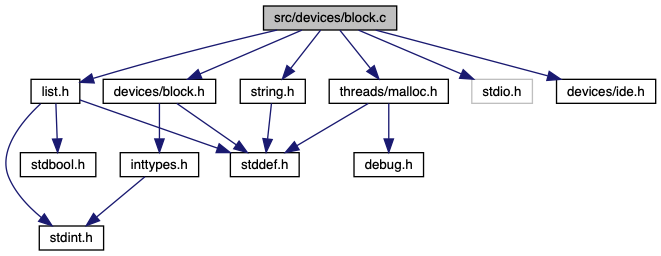
Go to the source code of this file.
Data Structures | |
| struct | block |
| A block device. More... | |
Functions | |
| static struct block * | list_elem_to_block (struct list_elem *list_elem) |
| Returns the block device corresponding to LIST_ELEM, or a null pointer if LIST_ELEM is the list end of all_blocks. More... | |
| const char * | block_type_name (enum block_type type) |
| Returns a human-readable name for the given block device TYPE. More... | |
| struct block * | block_get_role (enum block_type role) |
| Returns the block device fulfilling the given ROLE, or a null pointer if no block device has been assigned that role. More... | |
| void | block_set_role (enum block_type role, struct block *block) |
| Assigns BLOCK the given ROLE. More... | |
| struct block * | block_first (void) |
| Returns the first block device in kernel probe order, or a null pointer if no block devices are registered. More... | |
| struct block * | block_next (struct block *block) |
| Returns the block device following BLOCK in kernel probe order, or a null pointer if BLOCK is the last block device. More... | |
| struct block * | block_get_by_name (const char *name) |
| Returns the block device with the given NAME, or a null pointer if no block device has that name. More... | |
| static void | check_sector (struct block *block, block_sector_t sector) |
| Verifies that SECTOR is a valid offset within BLOCK. More... | |
| void | block_read (struct block *block, block_sector_t sector, void *buffer) |
| Reads sector SECTOR from BLOCK into BUFFER, which must have room for BLOCK_SECTOR_SIZE bytes. More... | |
| void | block_write (struct block *block, block_sector_t sector, const void *buffer) |
| Write sector SECTOR to BLOCK from BUFFER, which must contain BLOCK_SECTOR_SIZE bytes. More... | |
| block_sector_t | block_size (struct block *block) |
| Returns the number of sectors in BLOCK. More... | |
| const char * | block_name (struct block *block) |
| Returns BLOCK's name (e.g. More... | |
| enum block_type | block_type (struct block *block) |
| Returns BLOCK's type. More... | |
| void | block_print_stats (void) |
| Prints statistics for each block device used for a Pintos role. More... | |
| struct block * | block_register (const char *name, enum block_type type, const char *extra_info, block_sector_t size, const struct block_operations *ops, void *aux) |
| Registers a new block device with the given NAME. More... | |
Variables | |
| static struct list | all_blocks = LIST_INITIALIZER (all_blocks) |
| List of all block devices. More... | |
| static struct block * | block_by_role [BLOCK_ROLE_CNT] |
| The block block assigned to each Pintos role. More... | |
Function Documentation
◆ block_first()
| struct block* block_first | ( | void | ) |
Returns the first block device in kernel probe order, or a null pointer if no block devices are registered.
Definition at line 71 of file block.c.
References all_blocks, list_begin(), and list_elem_to_block().

◆ block_get_by_name()
| struct block* block_get_by_name | ( | const char * | name | ) |
Returns the block device with the given NAME, or a null pointer if no block device has that name.
Definition at line 87 of file block.c.
References all_blocks, list_begin(), list_end(), list_entry, list_next(), block::name, name, NULL, and strcmp().
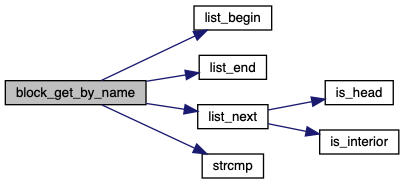
◆ block_get_role()
| struct block* block_get_role | ( | enum block_type | role | ) |
Returns the block device fulfilling the given ROLE, or a null pointer if no block device has been assigned that role.
Finding block devices.
Definition at line 54 of file block.c.
References ASSERT, block_by_role, and BLOCK_ROLE_CNT.
Referenced by filesys_init(), fsutil_append(), and fsutil_extract().

◆ block_name()
| const char* block_name | ( | struct block * | block | ) |
Returns BLOCK's name (e.g.
"hda").
Definition at line 151 of file block.c.
References block::name.
Referenced by check_sector(), found_partition(), partition_scan(), and read_partition_table().
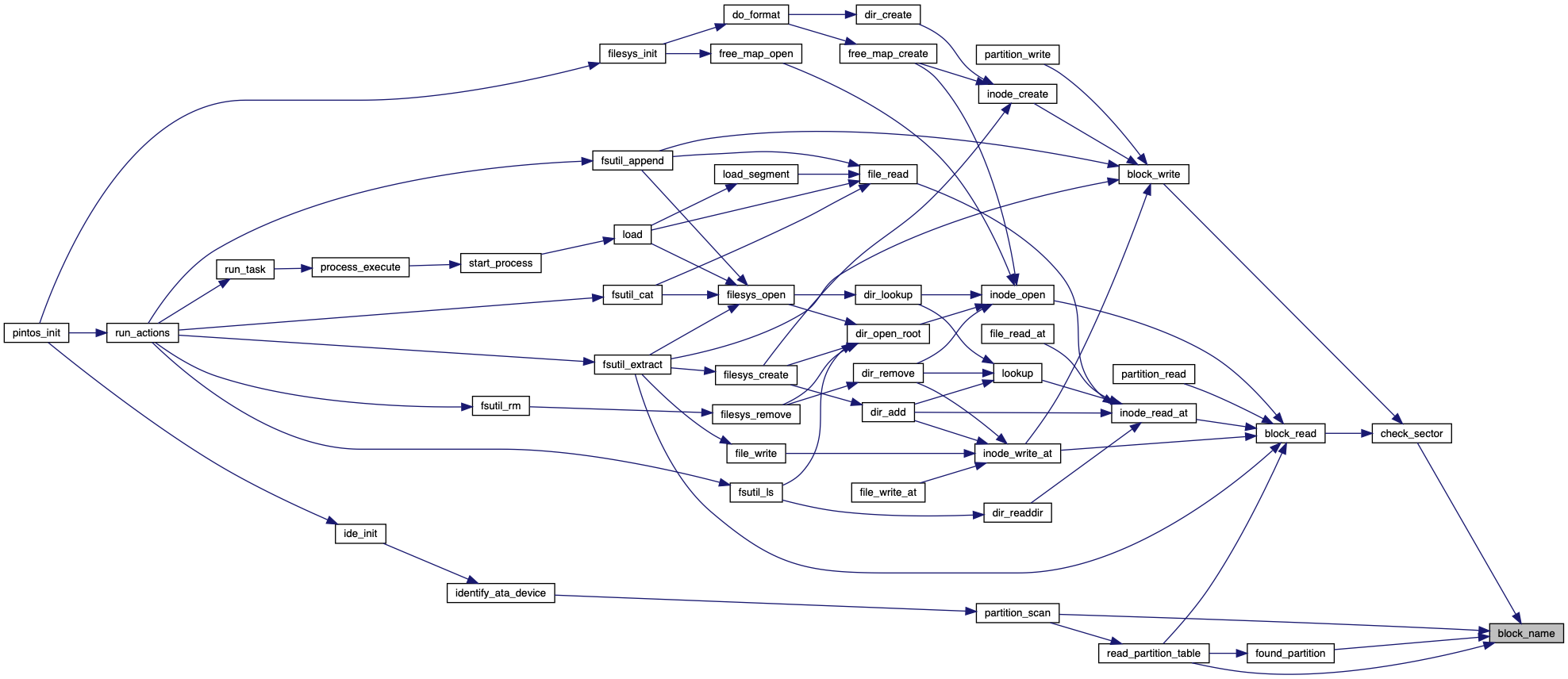
◆ block_next()
Returns the block device following BLOCK in kernel probe order, or a null pointer if BLOCK is the last block device.
Definition at line 79 of file block.c.
References block::list_elem, list_elem_to_block(), and list_next().
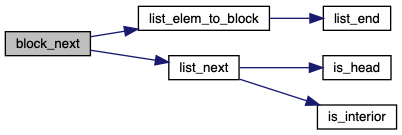
◆ block_print_stats()
| void block_print_stats | ( | void | ) |
Prints statistics for each block device used for a Pintos role.
Statistics.
Definition at line 165 of file block.c.
References block_by_role, BLOCK_ROLE_CNT, block_type_name(), block::name, NULL, printf(), block::read_cnt, block::type, and block::write_cnt.
Referenced by print_stats().
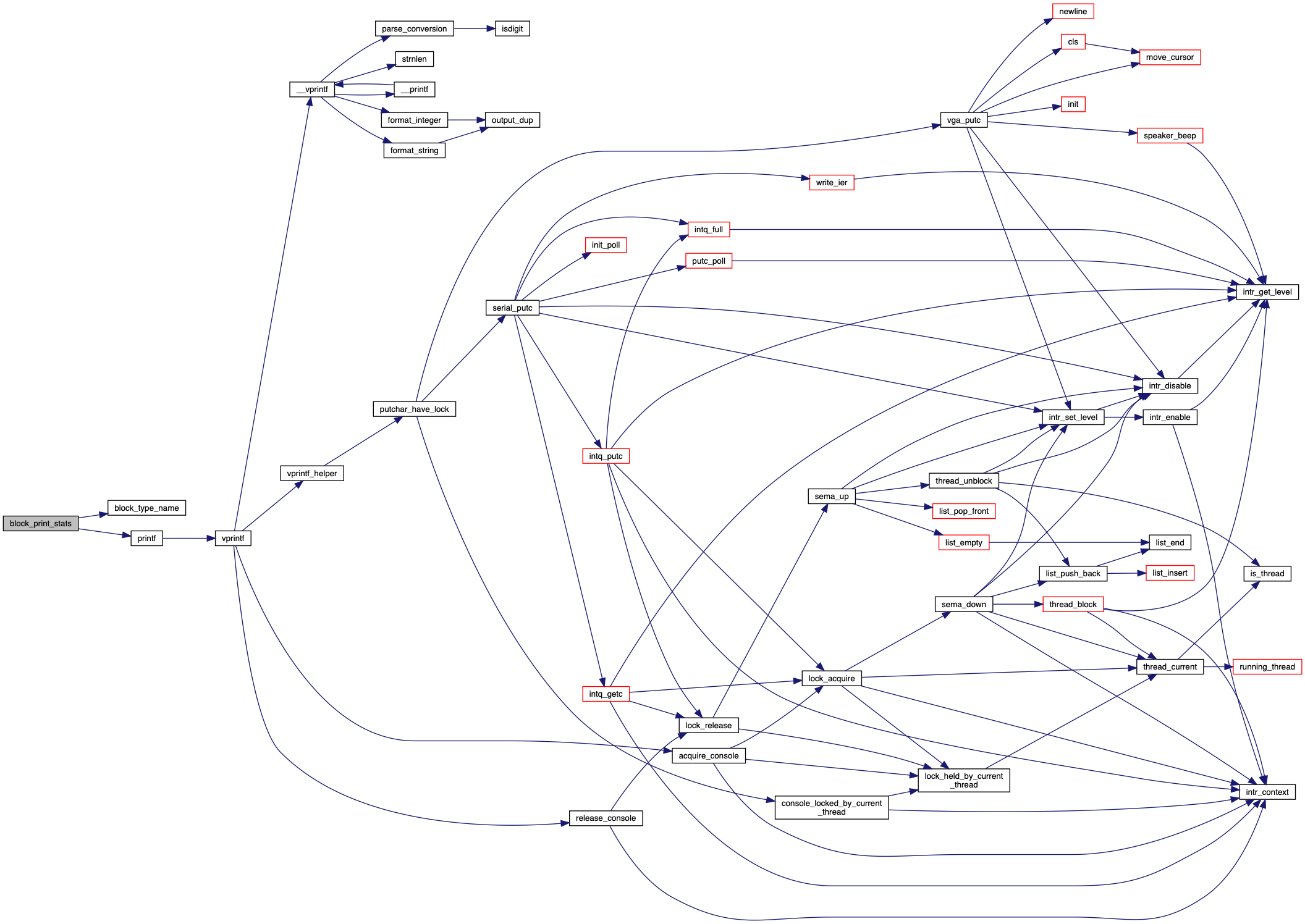

◆ block_read()
| void block_read | ( | struct block * | block, |
| block_sector_t | sector, | ||
| void * | buffer | ||
| ) |
Reads sector SECTOR from BLOCK into BUFFER, which must have room for BLOCK_SECTOR_SIZE bytes.
Internally synchronizes accesses to block devices, so external per-block device locking is unneeded.
Definition at line 121 of file block.c.
References block::aux, buffer, check_sector(), block::ops, block_operations::read, and block::read_cnt.
Referenced by fsutil_extract(), inode_open(), inode_read_at(), inode_write_at(), partition_read(), and read_partition_table().

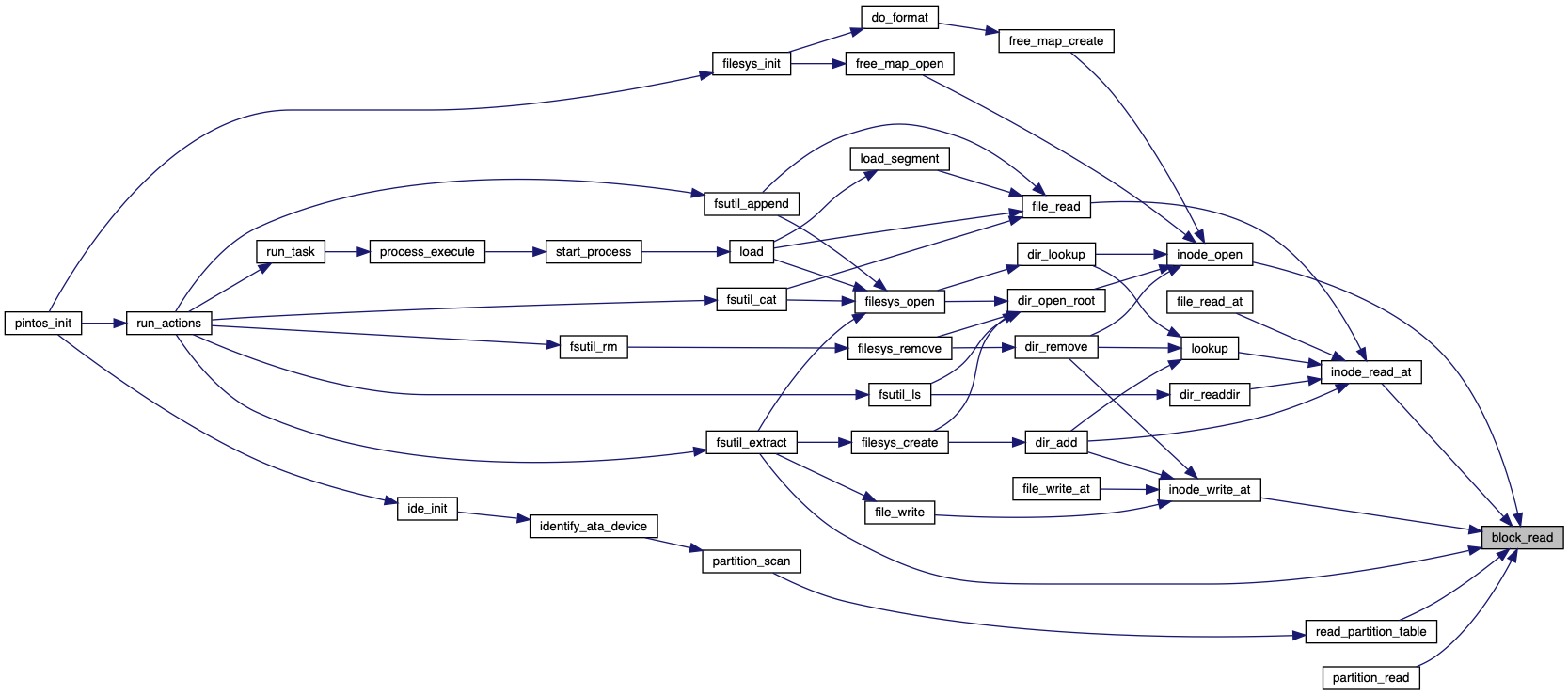
◆ block_register()
| struct block* block_register | ( | const char * | name, |
| enum block_type | type, | ||
| const char * | extra_info, | ||
| block_sector_t | size, | ||
| const struct block_operations * | ops, | ||
| void * | aux | ||
| ) |
Registers a new block device with the given NAME.
If EXTRA_INFO is non-null, it is printed as part of a user message. The block device's SIZE in sectors and its TYPE must be provided, as well as the it operation functions OPS, which will be passed AUX in each function call.
Definition at line 187 of file block.c.
References all_blocks, block::aux, BLOCK_SECTOR_SIZE, block::list_elem, list_push_back(), malloc(), block::name, name, NULL, block::ops, PANIC, PRDSNu, print_human_readable_size(), printf(), block::read_cnt, block::size, strlcpy(), block::type, and block::write_cnt.
Referenced by found_partition(), and identify_ata_device().
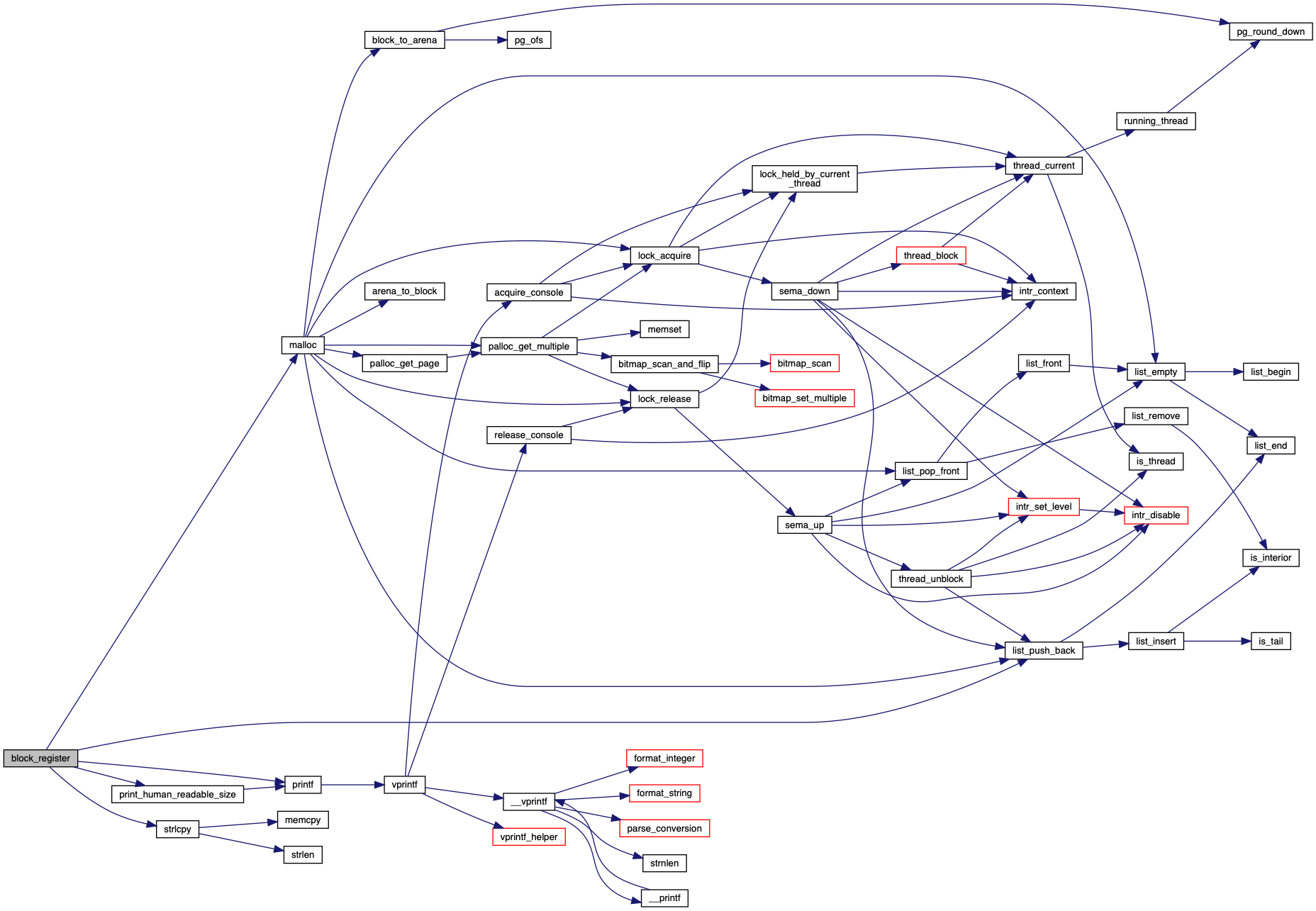

◆ block_set_role()
| void block_set_role | ( | enum block_type | role, |
| struct block * | block | ||
| ) |
Assigns BLOCK the given ROLE.
Definition at line 62 of file block.c.
References ASSERT, block_by_role, and BLOCK_ROLE_CNT.
◆ block_size()
| block_sector_t block_size | ( | struct block * | block | ) |
Returns the number of sectors in BLOCK.
Block device operations.
Definition at line 144 of file block.c.
References block::size.
Referenced by bitmap_create_in_buf(), check_file_handle(), found_partition(), free_map_init(), fsutil_append(), read_partition_table(), seq_test(), and write_some_bytes().
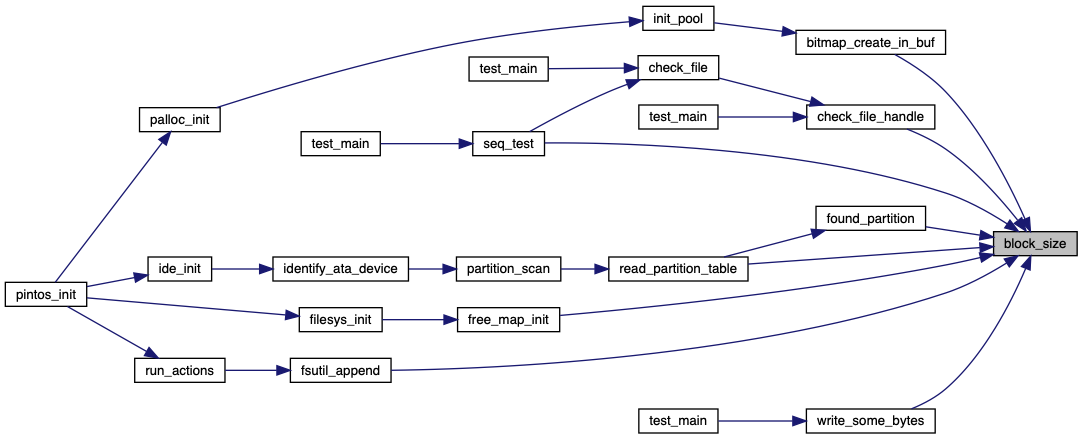
◆ block_type()
| enum block_type block_type | ( | struct block * | block | ) |
◆ block_type_name()
| const char* block_type_name | ( | enum block_type | type | ) |
Returns a human-readable name for the given block device TYPE.
Definition at line 35 of file block.c.
References ASSERT, BLOCK_CNT, and block::type.
Referenced by block_print_stats().

◆ block_write()
| void block_write | ( | struct block * | block, |
| block_sector_t | sector, | ||
| const void * | buffer | ||
| ) |
Write sector SECTOR to BLOCK from BUFFER, which must contain BLOCK_SECTOR_SIZE bytes.
Returns after the block device has acknowledged receiving the data. Internally synchronizes accesses to block devices, so external per-block device locking is unneeded.
Definition at line 134 of file block.c.
References ASSERT, block::aux, BLOCK_FOREIGN, buffer, check_sector(), block::ops, block::type, block_operations::write, and block::write_cnt.
Referenced by fsutil_append(), fsutil_extract(), inode_create(), inode_write_at(), and partition_write().

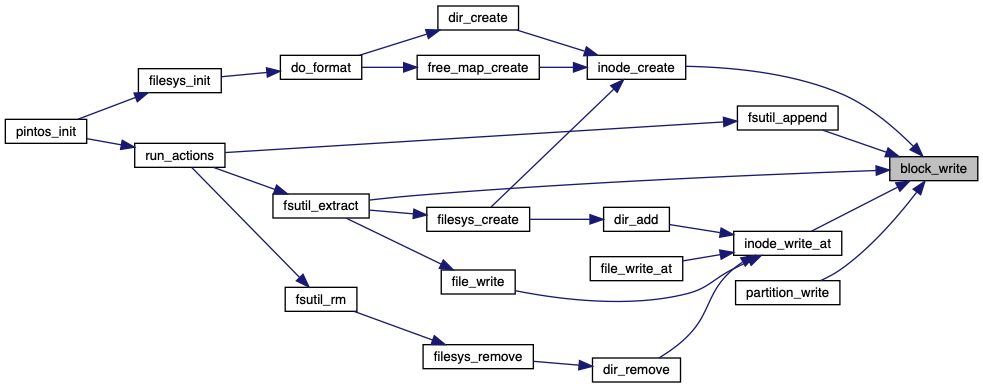
◆ check_sector()
|
static |
Verifies that SECTOR is a valid offset within BLOCK.
Panics if not.
Definition at line 105 of file block.c.
References block_name(), PANIC, PRDSNu, and block::size.
Referenced by block_read(), and block_write().

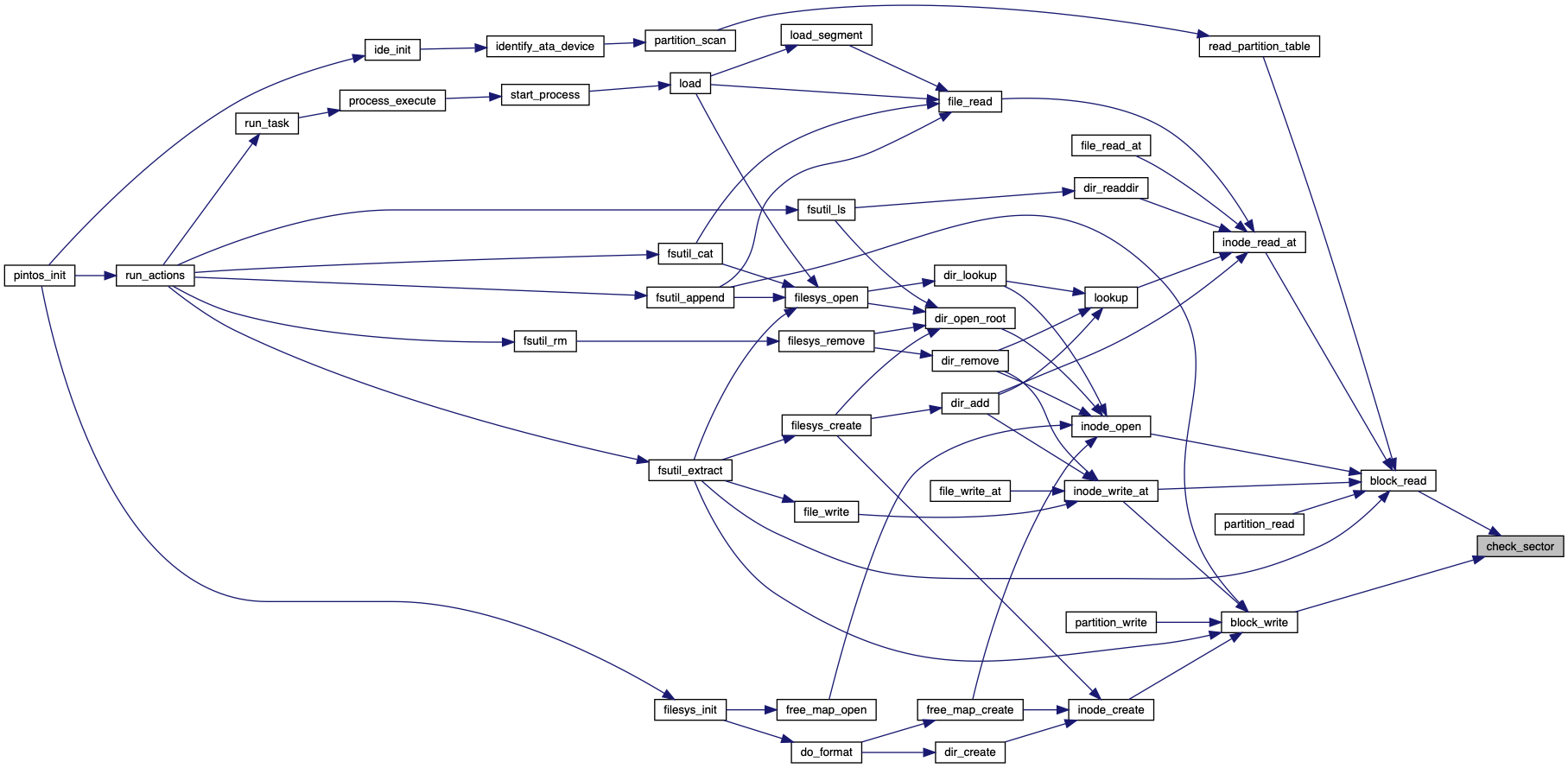
◆ list_elem_to_block()
Returns the block device corresponding to LIST_ELEM, or a null pointer if LIST_ELEM is the list end of all_blocks.
Definition at line 217 of file block.c.
References all_blocks, list_end(), list_entry, and NULL.
Referenced by block_first(), and block_next().


Variable Documentation
◆ all_blocks
|
static |
List of all block devices.
Definition at line 25 of file block.c.
Referenced by block_first(), block_get_by_name(), block_register(), and list_elem_to_block().
◆ block_by_role
|
static |
The block block assigned to each Pintos role.
Definition at line 28 of file block.c.
Referenced by block_get_role(), block_print_stats(), and block_set_role().
 1.8.16
1.8.16